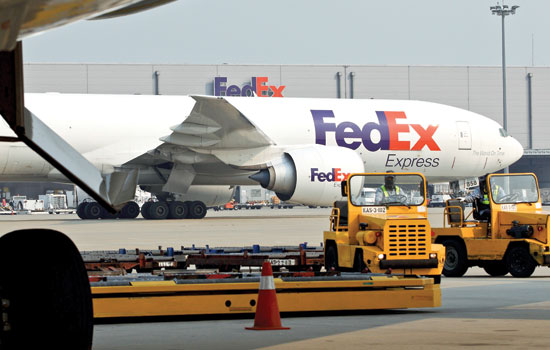Companies awaiting approval for business permits from authorities
The express transportation company FedEx Express Corp hopes to obtain permission to operate a domestic express business in China this year, according to senior managers at the company.
FedEx Express, together with United Parcel Service Inc, or UPS, are seeking permits from the State Post Bureau to conduct a domestic express business in China, according to a notice posted on the bureau's website.
|
 |
|
A FedEx Corp freight plane at Incheon International Airport in Incheon, South Korea. FedEx Express wants to operate express businesses in eight large Chinese cities, including Shanghai, Guangzhou and Hangzhou.?[Photo / Agencies]?? |
FedEx Express wants to operate express businesses in eight large Chinese cities, including Shanghai, Guangzhou and Hangzhou. And UPS has applied to do so in five cities, including Xi'an and Shanghai. Beijing is not on either company's list.
"We hope to get the permit as soon as possible," Alan Turley, vice-president of international affairs at FedEx Express Asia Pacific Division, said at the 2012 China Express Service Forum, which was held in Beijing on Tuesday.
FedEx Express started operating its domestic express business in China in 2007. China revised its post law two years later, forcing the company to apply for a new permit if it wants to remain in compliance with the law, Turley said.
"Allowing foreign express companies to join in the domestic express business demonstrates China's compliance with WTO rules," Ma Junsheng, director-general of State Post Bureau of China, said during the same event.
The Chinese express market is open to various enterprises, he said.
"Sufficient competition can help improve the quality of service in the Chinese express industry and benefit more people," Ma said.
He declined to say when the two foreign companies are likely to obtain the permits they are seeking, saying that depends on the results of the public scrutiny they are under.
The four largest logistics companies in the world - DHL Express, Federal Express Corp, TNT Express NV and UPS - entered the Chinese market during the 1980s. But none of them has managed to dominate the domestic market for its services.
One reason foreign companies have not done as well here as elsewhere, analysts said, is that China's domestic express companies still provide services at relatively low prices. With low labor and management costs, they have an advantage in conducting business in the country.
In July 2011, DHL divested itself of three Chinese express companies it had acquired in 2009, selling them to a domestic company. The sale marked DHL's complete withdrawal from the domestic express business on the Chinese mainland.
Da Wa, secretary-general of the China Express Service Association, said foreign companies hold less than 5 percent of the Chinese market for services in the express industry.
"Foreign companies' advantages are in branding, management and technology, which domestic companies can learn about from watching the competition," Da said.
The Chinese express market has been changing quickly in recent years.
"There is enough room for players from both home and abroad," Da said. "However, their combined abilities to provide services still lag far behind what's needed to meet the demand."
China is the third-largest market for express services in the world, behind the United States and Japan. By June last year, 6,890 express companies were doing business in China, up from 4,898 in September 2010.
China's express industry is expected to expand steadily in the next four years and have 143 billion yuan ($22.5 billion) in annual sales by 2015, according to the State Post Bureau of China.
shenjingting@chinadaily.com.cn
